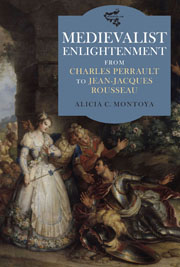Book contents
- Frontmatter
- Contents
- Dedication
- Acknowledgments
- Introduction
- I CONCEPTUALIZING THE MEDIEVAL
- II REIMAGINING THE MEDIEVAL
- 3 Survivals: Reading the Medieval Roman at the Dawn of the Enlightenment
- 4 Continuities: The Medieval as Performance
- 5 Reconfigurations: Medievalism and Desire, Between Eros and Agape
- III STUDYING THE MEDIEVAL
- Conclusion: Medievalism as an Alternative Modernity
- Bibliography
- Index
4 - Continuities: The Medieval as Performance
from II - REIMAGINING THE MEDIEVAL
Published online by Cambridge University Press: 05 May 2013
- Frontmatter
- Contents
- Dedication
- Acknowledgments
- Introduction
- I CONCEPTUALIZING THE MEDIEVAL
- II REIMAGINING THE MEDIEVAL
- 3 Survivals: Reading the Medieval Roman at the Dawn of the Enlightenment
- 4 Continuities: The Medieval as Performance
- 5 Reconfigurations: Medievalism and Desire, Between Eros and Agape
- III STUDYING THE MEDIEVAL
- Conclusion: Medievalism as an Alternative Modernity
- Bibliography
- Index
Summary
Despite a rhetorics of Enlightenment that habitually contrasted the medieval to the modern, a number of early Enlightenment authors seem to have perceived no fundamental historical break between the two periods. By his striking refusal to use the term “middle ages” (moyen âge) in the Parallèle des Anciens et des Modernes, Perrault implicitly annexed the medieval period to modernity. Similarly, in his Esprit des Lois Montesquieu emphasized the continuity between the modern French spirit of gallantry (esprit de galanterie) and the medieval cultural practices illustrated by chivalric fiction. And even earlier, in his prescient dialogue on medieval romance, Chapelain had already suggested that there was a relation between medieval and modern forms of expression, with Lancelot and similar titles singled out as “the source of all the romances (romans) that, for four or five centuries, have been the noblest amusement of the courts of Europe”. These statements, then, were part of a broader debate, between eighteenth-century medievalists and anti-medievalists, on the legacies of the medieval past, as transmitted particularly through chivalric fiction. Chapelain's thesis of continuity between medieval and modern literature offered a rebuttal of other, progressivist assessments, which on the contrary sought to distance modern literary productions from their medieval precursors. Regardless of the question whether such continuity really existed, i.e. whether seventeenth- and eighteenth-century literary productions drew on authentic medieval models, the fact that authors emphasized such historical connections is revealing.
- Type
- Chapter
- Information
- Medievalist EnlightenmentFrom Charles Perrault to Jean-Jacques Rousseau, pp. 107 - 144Publisher: Boydell & BrewerPrint publication year: 2013



